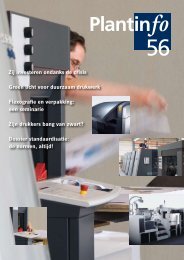A hArd-hitting - Plantin
A hArd-hitting - Plantin
A hArd-hitting - Plantin
Create successful ePaper yourself
Turn your PDF publications into a flip-book with our unique Google optimized e-Paper software.
Heidelberg News • opportunities<br />
“Children enjoy reading<br />
but need support.”<br />
SABINE BoNEWITz<br />
sPoKesWoMan in tHe<br />
faMilY anD DaYCare<br />
Center DePartMent of<br />
stiftUnG lesen in Mainz,<br />
GerManY<br />
Ms. Bonewitz, do children still enjoy reading?<br />
Sabine Bonewitz: Yes, very much so. around half of all children<br />
regularly enjoy reading, but the proportion of non-readers<br />
has risen to 17 percent.<br />
What impact does new media have on reading?<br />
Bonewitz: the large amount of new media has made it<br />
more difficult to get children who are not such keen readers<br />
interested in reading. Many of them come from backgrounds<br />
where reading is not a top priority. these children often<br />
experience greater problems at school because they do not<br />
have basic reading skills, which would significantly boost<br />
their educational opportunities.<br />
How important is print in terms of learning to read?<br />
Bonewitz: extremely important. Magazines for children, comics<br />
and sections of daily newspapers aimed at children and<br />
adolescents are very popular with their target audience because<br />
they are fun. at school, reading is seen as work, which is why<br />
children need support at home until they have completed<br />
elementary school. When children see their parents reading a<br />
newspaper or book, they want to as well. a passion for reading<br />
needs to be instilled and nurtured from an early age.<br />
How does Stiftung Lesen support parents and children?<br />
Bonewitz: as an foundation to support reading, we have initiated<br />
a wide range of projects to encourage reading among<br />
children and adolescents since 1988. our nationwide “start<br />
reading” campaign is aimed at the parents of small children,<br />
who receive a start reading set from doctors at routine checkups.<br />
We have around 8,000 volunteers who spend their spare<br />
time reading books aloud in kindergartens, schools and book<br />
shops. We also organize all kinds of reading contests in schools.<br />
in addition, we work with cooperation partners to develop<br />
teaching materials, for example for the “Magazines in schools”<br />
project. schools receive packages of suitable magazines and<br />
brochures with ideas for lessons for a period of one month.<br />
Without the support of a large number of companies, including<br />
Heidelberg, we would not be able to implement such<br />
projects. it would, however, help if we were allocated a permanent<br />
state budget. that would lessen the impact of economic<br />
downturns and help us encourage reading.<br />
info // www.stiftunglesen.de<br />
46 • Issue 268 • 2009<br />
your question – no, GEOlino would certainly not be as successful as<br />
a purely online magazine. We can exploit our strengths – such as<br />
the significant visual appeal I mentioned earlier – more effectively<br />
on paper.<br />
Franco Rota: Conversely, it may be possible to conclude<br />
from the success of your children’s magazines that, in general,<br />
factors such as a leisurely read and a love of the printed word can<br />
never go out of fashion. The Internet is not perceived as a reliable<br />
medium, even by those who use it frequently, as it changes far<br />
too quickly and people now know how easily content can be<br />
manipulated.<br />
Adriana Nuneva: That may be so, but that doesn’t alter<br />
anything about the growing pressure on traditional media. And<br />
the Internet is just the beginning. In Japan, for example, cell<br />
phones have long been used for online news. The traditional books<br />
in space-saving, one-handed format have now disappeared completely<br />
from the subway, as too have posters, which in busy locations<br />
have been replaced almost entirely by screens. To my mind, those<br />
are examples of market-oriented communication with offerings<br />
that quite clearly address an existing need. If newspapers and<br />
magazines wish to remain competitive in this area, they need to do<br />
more than just adapt their content, as we have already discussed.<br />
Targeted, broad-based promotion of reading is just as important.<br />
Reading a newspaper has a lot to do with habit and ritual. This is<br />
something that should be instilled in children and young people<br />
as early as possible.<br />
Karsta, how do you promote reading at your school?<br />
Karsta Holch: Our teachers do an enormous amount these<br />
days to get children reading. This includes school-based, regional<br />
and nationwide reading contests that the Helmholtz High School<br />
Heidelberg takes part in. We also have events with authors who<br />
read out the first few chapters of their new books, for example,<br />
and are hugely successful in inspiring children to read more.<br />
Another particularly nice feature is in the form of projects in<br />
collaboration with the newspaper Rhein-Neckar-Zeitung, which sends<br />
our students as sports reporters to the nearby 1899 Hoffenheim<br />
soccer club and prints the resulting articles. This is naturally a great<br />
thing for students.<br />
Franco Rota: Promoting reading is, of course, a very important<br />
factor. But I doubt it will automatically help save print media.<br />
The Internet is no place for non-readers – quite the opposite in fact.<br />
And we now know the Internet widens the gap between high-volume<br />
readers and non-readers. That is to say, although high-volume readers<br />
do not read more, low-volume readers read even less.<br />
Martin Verg: That may be, but it doesn’t alter the fact that<br />
there can be no alternative to promoting reading as comprehensively<br />
as possible. As I see it, this also includes titles such as GEOlino that<br />
can certainly open doors for young adults. We can turn children into<br />
readers on paper by taking them seriously as readers, captivating





